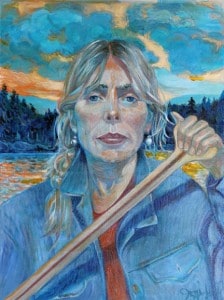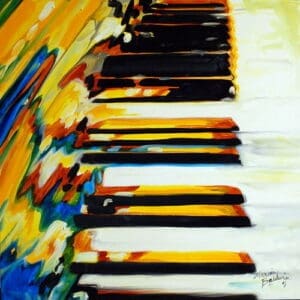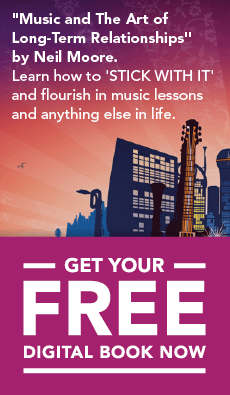 We all know musicians are special people – they are typically deep thinkers and observers of the world, as well as being passionate and generous. In our recent exploration of jazz, one of the artists we spoke to was so magnanimous and insightful in her observations that we thought it was worth looking more closely at her life – the life of a professional creative artist.
We all know musicians are special people – they are typically deep thinkers and observers of the world, as well as being passionate and generous. In our recent exploration of jazz, one of the artists we spoke to was so magnanimous and insightful in her observations that we thought it was worth looking more closely at her life – the life of a professional creative artist.
Christine Sullivan’s story is one of constant change. Although she is commonly classified as a jazz singer, her interests are far wider and more inclusive than fits into that label. This in-depth profile is an opportunity for an insight into the development of a restless creative spirit. Being an artist involves risk, trust and honesty, but Christine is a shining example of the emotional and spiritual rewards of putting yourself on the line.
The search for a voice
From a young age, Christine found singing a way of connecting and of breaking out of her quiet, shy nature: “I’d been singing since ’65 in Eisteddfods, and trained by my uncle – he was a self taught musician, could play a mean harmonica… and married my mother’s sister when she was just 17. Their daughters were all trained to sing and we won all the competitions. I was not quite 7 when I won equal first, singing an Australian original song called Bells…I lost points for standing behind the pianist and having to be prompted to stand in the front of the piano. They rang an actual bell a few times, to stop the audience talking as I was singing so softly!!”
Singing to me is not a role, or an act, it is who I am in the moment
After enjoying all the opportunities Tasmania had to offer (including supporting touring stars like Don McLean and Kris Kristofferson, TV, radio, advertising and festivals), Christine eventually moved to Melbourne with her restaurant manager partner Franklin Heaney to develop their careers. A small scene like Tasmania trains you to be adaptable, which prepared her for whatever Melbourne could throw at her. First up, that was the funk band In the Pocket, which then led her to forming her own funk outfit, playing originals as well as songs from the likes of Al Jarreau and Dianne Reeves – “Little did I know she would hear me sing in the Thelonious Monk Vocal competition in ’98!!”
“I did backing vocals for Randy Crawford and realized I needed to find a direction of my own, and find my own voice – trying on different musics for size, so to speak. A bit like Ray Charles, it took him half his life of emulating other singers and singing other people’s songs, until he was asked to sing Georgia one night and he hadn’t heard anyone do it, so he improvised from his gospel blues roots. His style was born and then nurtured through the gigs and years.”
That process of finding her own voice led her through lessons with the legendary soul singer Venetta Fields, classical training, and working with some of the cream of Australia’s jazz scene: “All through my experience as a singer, my voice and ability to attract and read the needs of a crowd attracted the musicians of the highest caliber, who then helped to educate me and inform my choices. It was a healthy, enriching experience… I also learned how to communicate through my sound, my own truth and vision… My own perspective, through another person’s words or melody…”
“The musicians that gravitated to my voice were all the best of their time, and loved the music as I did… Making music was like a fellowship, an honorary club, and I became one of the boys very early…. I had two brothers, who were much older, both where dabbling in music when I was young… I was comfortable working as a team with the musicians and understood the male ego… When I was coming up it was a male dominated world of music. Female musicians were rare in a band.”
Joni’s Inspiration
 Christine developed a reputation as an interpreter of Joni Mitchell’s songs: “As I grew up with each of Joni’s Albums, among other singer/songwriters, I was already under the spell of this era of music… The most powerful years for listening are around the age of 16-25. Whatever one is listening to in these vulnerable developing years stays with you for life, and will be the music you take to the desert island… My brain, impressionable and developing, photographed the music of the time, along with all the feelings of being a young person in the seventies/eighties…”
Christine developed a reputation as an interpreter of Joni Mitchell’s songs: “As I grew up with each of Joni’s Albums, among other singer/songwriters, I was already under the spell of this era of music… The most powerful years for listening are around the age of 16-25. Whatever one is listening to in these vulnerable developing years stays with you for life, and will be the music you take to the desert island… My brain, impressionable and developing, photographed the music of the time, along with all the feelings of being a young person in the seventies/eighties…”
“Joni’s lyrics, and choices of musician, the purity of her sound early on, and her clarity of expression…so mature for such a young writer. The fact she was female was an inspiration – she seemed strong and driven…. She is supremely creative, and a real artist who paints music. She is mainly self taught, though was lucky to have some piano at an early age. She also seemed to be going through all the things we were all going through and expressed them in her songs so well… I bought each album as she recorded them, Hejira being a favourite… I became aware of the great Jaco Pastorius, and that bass sound…that harmony…the bass became alive and energized her music… It was sublime.”
“In most of my recordings, I give a nod to the music that was always around me… Once evolving as a songwriter had its drawbacks when I needed to record. When one can write from experience, it becomes a personal, unique musical experience. I had to understand other people’s lyrics, as if I had written them myself…the interpreter… I always could infuse my own colours into the sound to make a completely fresh take on the song – a saving grace, which I am grateful for… My goal became the quest to free my own voice and attract the songs to it….”
A very personal album
In her more than 20 years in Melbourne, Christine recorded a number of albums, through which you can clearly hear the progress of her musical search. The final album, Away, is without doubt her most personal and original.
Interestingly, though, this opportunity arose in the middle of a hiatus and a period of reflection: “My Mother died in Oct 2001, and Sept 11th happened in that period too. These events marked the beginning of a slowing down, a re-evaluation, Buddhism, sitting down at the gigs, and wanting to disappear into the music… wanting to not be there physically, but only in sound…”
“Sound became a major focus. The morning after Sept 11th I was being made up in the studios of channel 9 for an Arts Program… It was with [pianist] Joe Chindamo… The song we had prepared a week before was Danny Boy… It was a coincidence (or not) that the song was about a father saying goodbye and remember me to his son as he goes off to war… We couldn’t believe how apt it was… We were all shell shocked.”
She had also parted ways with long-time collaborator and musical director Jeremy Alsop: “This was a big move, but needed to happen…. I tried to replace his formidable presence with some great players and none could fill the shoes, his experience and aesthetic were one and the same… He and I both loved the same musicians, music and type of playing… I had absorbed so much while with him and [saxophonist] Tony Buchanan…their influence had changed me. I also had Jeremy on a pedestal.”
“I continued for another 4 years without Jeremy…and realized on stage at Bennetts Lane that the thrill had gone!! I took a break from performing live locally in 2007. I gave my last gig at Bennetts Lane to a student.”
“So the break, for me, was because I could not re-create the same environment without a Jeremy at the helm… people like Jeremy are rare.” As well, “When my mother passed away, and my cousin Sally in the same year, it seemed as if the wind had gone from the sails… the drive had gone… I needed to reboot and re evaluate my reason to live…”
So out of those ashes rose an opportunity to record a different album, “prompted by a generous donation from two music and audiophile fans, now dear friends, Don and Sharon Giovanakis. They really wanted me to record.”
“The CD’s music was inspired by the years of influence from the musicians I collaborated with… The whole concept came into being close to the recording date, with some lyrics I had penned the night before the session, some African proverbs, the musicians agreeing to a date and booking an 8 hour session. We had a few tunes we were familiar with and had performed together. We decided to just go in, set up, and press record for the bulk of the CD… [drummer] David Jones kindly asked me what the brief for the recording would be? Any instructions? My reply – no instructions, just don’t forget about me… There were two takes of each and we chose sections and whole takes we all liked. Four tracks were spontaneous combustions, and some ended up a single take.”
…being in the moment, listening deeply, collaboration with others, and being adventurous and fearless, inspired, are all great lessons for us all
“It was a wild and risky experiment, driven by a small budget, limited time, and heart and soul. I was also curious to hear what we could all do without guidelines, charts, songs, arrangements. I was curious to see if we could record a free flowing consciousness music… we had done this many times at gigs, with this group of musicians… Live in the moment it is powerful and we were prepared to take the risk of it sounding on record under-produced… Some tracks can be listened to forever over and over and would still feel good to the senses… the ear could always find more to hear.”
“Also, I wanted the CD to feel spacious, vast, sometimes desolate, yet full of promise. It was a farewell, a thank you, a bon voyage, a way to record, a way with the music making, a way to go… a way to another world. spiritually and actually. I was saying goodbye…and a full circle had joined with River being the first track recorded in 2007 with Canadian/ New Yorker pianist Andy Milne a dedication to Sally. River was a Joni Mitchell track that inspired me to keep singing at 13 when I first heard Sally sing it at the piano… Sally was leaving the vocal group, and I wanted to stop singing as I was feeling all the pangs of self consciousness of a young teen and the other girls were well developed..! My Mother and Joni Mitchell convinced me to keep singing..!”

“The tracks number 8 in all, and 8 is my number in numerology, it has significance in Chinese astrology and its shape is infinity… the full circle, the beginning the middle the end the beginning again… ad infinitum.”
“I also felt that this could be my last recording… or not… Most of the tunes were open ended, which is how my life was feeling. There is a great freedom in not knowing…. Uncertainty and detaching from the outcome was not scary to any of us… We created the pieces from love and trust and friendship… We left the constructs of the written notes on a page, behind..! Audacious audio..! AWAY we go… result perfectly not perfect… A moment in time… gone forever… always here…”
Moving to New York
A few years ago, Franklin had the opportunity to work in New York, and with connections formed through many visits there, Christine saw a wonderful chance to reinvent herself once again: “Frank and I were invited to the first International Jazz day celebration at the UN for an all star 2 hour concert celebration, the first of which started in Paris, then went to New Orleans and then New York… on the 30th April 2012… our first year here…. Stevie Wonder, Chaka Khan, all of the latest Jazz Greats old and new and internationals.”
“Here in NYC I am studying Jazz with Don Sickler, a Master of Jazz. He is an archivist and publishes music, is an educator at Columbia, and is musical director for years for the Thelonious Monk Institute of Jazz. These years for me are about consolidation, reaffirming my commitment to music, some recording, and maintaining my interest in music through study, for the life of the voice, perhaps the next 6 to 8 years, until the voice is diminished and/ or the thrill is gone..!”
She hopes “to inspire others to keep nudging the boundaries of their music – to be fearless in their exploration and respectful of the past, helping musicians to see the value of controlling the ego and staying open hearted, generous,and collaborative. To stay an advocate of new music – today’s music – to be open always to change and evolution, to keep learning and developing personally, to help others understand the fun in reaching higher, having big dreams, pushing the limits of what you think you can do… Seeing potential for unlimited possibilities… Living as if your life is the work of art… a gift to be given…”
Jazz & Change
 Jazz has woven itself through most of her work. “[Don Sickler] wants me to stop saying I am not a jazz singer…. Just trying to appreciate jazz will in itself make your time worthwhile… It is a stimulating music and you can develop a taste for it. If you are listening to music with a jazz musician who can explain a few things to you, about the choices the player is making and what is happening in the form of the tune – how many bars the player is improvising for – and explain chords, and their composition and flavours, these can capture someone’s imagination…”
Jazz has woven itself through most of her work. “[Don Sickler] wants me to stop saying I am not a jazz singer…. Just trying to appreciate jazz will in itself make your time worthwhile… It is a stimulating music and you can develop a taste for it. If you are listening to music with a jazz musician who can explain a few things to you, about the choices the player is making and what is happening in the form of the tune – how many bars the player is improvising for – and explain chords, and their composition and flavours, these can capture someone’s imagination…”
“If someone is a mathematical thinker there is a lot of interesting order to jazz and yet at the same time anything goes, so it’s helpful for the restricted and sceptical to be alerted to all the fun there is in the moments of improvising.”
“Just the philosophy of jazz…being in the moment, listening deeply, collaboration with others, and being adventurous and fearless, inspired, are all great lessons for us all, players and listeners alike…”
“Younger generations are hip to a lot of genres, and are more open than ever before to new music and jazz music presented to them, exposed to many music genres from independent labels to self publishing works…”
“I have never wanted to aspire to become any type of singer… I tested the waters of different musics, to see what fitted with me at the time. There was never any thought of deliberately trying to be influential… All my choices were intuitive and many happened to be ahead of my time by being unique choices…”
Improvisation as Communication
“Pure improvisation seems to become a timeless, genre-less thing in the skilled hands of a master like percussionist Trilok Gurtu or Some Northern Indian classical performers… One can hear every music of all nations…”
“I am now more interested in sounds and harmony than even lyric. I prefer to embody music… as if I am breathing it in. It can become total expression, you can lose yourself in it… it is for me a means of communication.”
“Singing to me is not a role, or an act, it is who I am in the moment. I think I improvise but not in the jazz intellectual sense – I don’t think when I sing, I dream. I don’t hear myself saying, ‘I must sing the 9th of this chord or the 7th might be nice’… I just hear and do.”
“I choose to sing as if I am speaking. The voice to me is an extension of the speaking voice. It is thereby unique as no voice is the same. Add expression and your story and you have an original contribution.”
Developing yourself
“Listen to music of the past with open mind… Appreciate that technology was still in its infancy…Watch the performances, learn the repertoire and understand the form of most jazz tunes…”
“Practice tunes as much as possible with other like minded individuals… set up regular rehearsal and use the facilities provided in colleges, the practice rooms and the equipment. Organize concerts in lunch times and breaks and go to other people’s performances… meet musicians, ask questions, ask to jam and or to join a band…”
“Ask for what you need and want… try things… don’t be afraid to experiment and make mistakes in improvising… just leap into the solo and enjoy the experience…”
“Avoid comparing yourself, though this will happen, it can be destructive. We are all unique… Miles Davis didn’t have the technique and speed Gillespie had so he went his own way – and thank goodness he did…”
“Studying is good, as it is a language and you have to deal with others who know it. Learning music while the brain is developing is the best thing, but you can start at any age…”
Taking oneself too seriously can really spoil it for you… too much thinking spoils the music, and being too anxious about mistakes is detrimental… There are no mistakes in jazz, just opportunities to learn and solve problems…
“When you have finally arrived at the perfect combination of people to work with, you enjoy the bond of the flow of the music on stage. Listen, relax, breathe, and soar… There are few experiences like this…”
“Persist and continue if you enjoy it… It really is the journey that is the best… the doing… Do BE DO BE DO!!!!!”
The Creative Moment
“Creativity gives meaning to a life and moments… For me a creative moment is like a flow state – there is not so much intellect involved. There is a feeling of being in a meditative state… and occurs during a performance… The work has been done in rehearsal, which can also be a type of flow, when we all are on the same page and things really gel. This happens more when the band has a strong core of people who know each other well…”
“Creating is really joyful… When you are taken away by the creative act, time stands still… time is irrelevant… It’s different to being busy or productive… these are more mechanical processes. It is not in the practice time, when you are working on aspects of technique or singing scaled exercises or practicing licks….”
“A creative moment feels like an accident… it surprises you… It fills you with wonder. When you are in a creative moment, you are not conscious or fearful of mistakes – you are not self conscious…”
 “When I am in performance, I find I can focus better when the eyes are closed… I am less distracted… I’ve been told you can hear better when the eyes are open. Perhaps this is true, but in my experience, I feel more deeply with the eyes closed… opening them only sometimes to check I am still actually there, in the building!”
“When I am in performance, I find I can focus better when the eyes are closed… I am less distracted… I’ve been told you can hear better when the eyes are open. Perhaps this is true, but in my experience, I feel more deeply with the eyes closed… opening them only sometimes to check I am still actually there, in the building!”
“I have been working on writing prose, and lyrics and writing flows for a long time. Some of my best ideas for themes come for the conversational writing flows, and are often inspired by watching live performances of some of the great singer /songwriters… Ricki Lee Jones’ performance of Skeletons inspired a writing session, as did Patty Griffin’s Song Kites…”
“Some of the greatest achievers in music are those with enormous crosses to bear… Ray Charles, Stevie Wonder, Billie Holiday, to name a few…. It really is the levels of difficulty and the person’s ability to bounce back which is where the greatest creativity will seed and grow, the great ideas… Both Sides Now, Joni Mitchell… Bob Dylan flowing writing… Inspired by the road, the time and being alone young hungry and homeless…”
“Many of my songwriting friends travel when they become blocked. Change evokes creativity, and inspires. Injects the soul with hope and energy…”
“For the singer, there is the emotional aspect and the sound of their voice, its power to connect through pure sound, their truth and their wisdom – life-inspired creative singing… Film, reading and spontaneous experiences, meeting many interesting people and being surrounded by like minded people, who want to be creative, really helps…”
“Too much isolation won’t necessarily inspire a work, or a performance, there needs to be a balance… It’s also so helpful to have enough sleep, and be as healthy as possible…[although] sometimes too much coffee has inspired lyric writing binges…”
“I have just met a hard working creative, Kirk Nurock, who writes most days. He has studied the works of the masters – Cole Porter, Bernstein and the classical masters. He is a meticulous, self-realised musician, totally comfortable with where he is at, not at all interested in money or fame, just working on his pieces… and passing on his deep knowledge of composition at The New School of Music in Manhattan. A prodigy, he is now in his 60s and still going strong. Being around these people is a source of inspiration to keep reaching for more joy – the real true joy of losing oneself in the process. It takes the audience with you and gives them permission to do the same in their lives. I believe there are many ways a person can be creative – in the home, garden, in their business, as a communicator… People dress creatively – it is not confined to the arts – it is a trait of the mind…”
The value of music
“I am a person who sings, for the soul healing and soothing of others. This in turn heals and soothes my soul also. It is a call to love and be loved. It is a call for truth and beauty, authenticity. acceptance, value, respect and relevance and inclusion joy and lightness of being. A voice is for everyone… and everyone has a voice – their own sound…”
“I will be forever grateful for everything this voice drew to it, and what came about because of it… My voice was more positive than me on occasions and wouldn’t give in…”
Music is capable of healing, soothing and relaxing the mind and body of the creator and the listener. Music can inform a way of life. The arts offer humanity another perspective
“It could continue to touch many people’s hearts. I hope it does, and I hope they can hear and understand the joy of music… the joy we all feel when we are focused on the moment…”
“I believe a musician is one who plays an instrument of any kind and has learned one way or another to use it to communicate a personal truth and beauty, by writing down, developing it, or performing it, composing it… Making music is a creative, ever-changing much cherished gift of love.”
“The Australian aboriginals have a word for deep listening. They can also see further into the distance than any human alive…”









